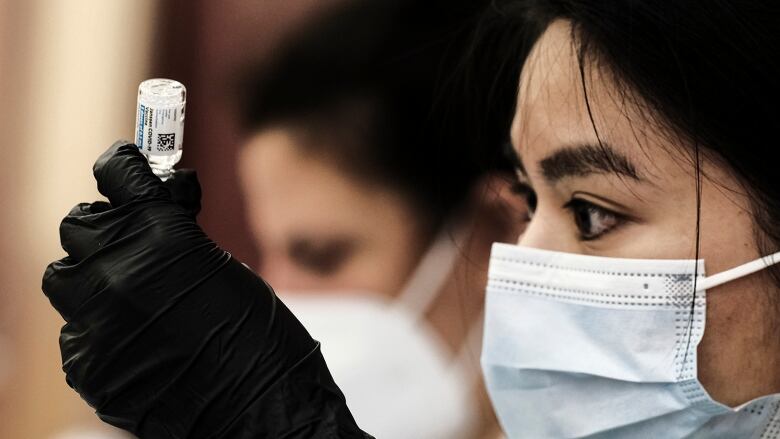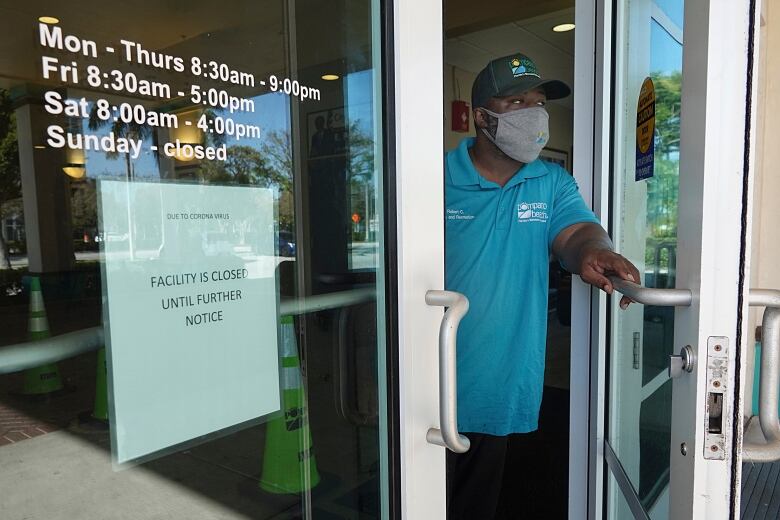U.S. recommends 'pause' for Johnson & Johnson vaccine in response to 6 clot reports
More than 6.8 million doses of the J&J vaccine have been administered in the U.S

U.S. health officials are recommending a "pause" in administration of the single-dose Johnson & Johnson COVID-19 vaccine to investigate reports of potentially dangerous blood clots.
More than 6.8 million doses of the J&J vaccine have been administered in the U.S. the vast majority with no side effects or mild ones. But ina joint statement Tuesday, the Centers for Disease Control and Prevention and the Food and Drug Administration (FDA) said they were investigating unusual clots in six women that occurred sixto 13 days after vaccination.
The clots occurred in veins that drain blood from the brain and occurred together with low platelets. All six cases were in women between the ages of 18 and 48.
Speaking to reporters on a teleconference, Dr. Peter Marks, the director of the FDA Center for Biologics, said thereports appear similar to a rare, unusual type of clotting disorder that European authorities say is possibly linked to another COVID-19 vaccine not yet cleared in the U.S., from AstraZeneca.
Boththe J&J and AstraZeneca productsare viral vector load vaccines. There have been no reports of any post-vaccination clots in people who have received the Pfizer or Moderna shots, which are based on mRNA technology, Marks said.
"I hesitate to call it a class effect but it's plainly obvious ... that what's happening with the [J&J]vaccines looks very similar to what has been seen with AstraZeneca," he said.

U.S. federal distribution channels, including mass vaccination sites, will pause the use of the J&J shot, and states and other providers are expected to follow. The Moderna and Pfizer vaccinesmake up the vast share of COVID-19 shots administered in the U.S. and are not affected by the pause.
The single-dose vaccine has been approved herebut Canadahas not yet received any doses.
With 10 million doses of the one-shot vaccine on order, Prime Minister Justin Trudeau said today Canadian officials are closely monitoring the decision by U.S. health authorities.
"We can assure everyone that Health Canada will, every step of the way, put the health of Canadians first and foremost around any decisions we make around the distribution of the vaccine," Trudeau said.
Trudeau said Canada's immunization campaign can continueat its current pace even if there are significant delays in deploying the J&J shot because deliveries of thePfizer, Moderna and AstraZenecaproducts are moreconsistent nowand44 million doses of those three vaccines will be on hand by the end of June.
"We signed deals with a large range of potential vaccine makers because we didn't know which ones would be most effective, which ones would arrive early. That's why Canadians are well served," he said. "It's a good thing that we have such a variety of contracts."
'Abundance of caution'
The CDC's Advisory Committee on Immunization Practices will meet Wednesday to discuss the cases. The FDA has also launched an investigation into the cause of the clots and low platelet counts.
"Until that process is complete, we are recommending a pause in the use of this vaccine out of an abundance of caution," said Dr. Anne Schuchat, principal deputy director of the CDC, in a joint statement withMarks.

"We don't have a definitive probable cause," Marks said. "This is an immune response that occurs very, very rarely after some people receive the vaccine. That immune response leads to activation of theplatelets and extremely rare blood clots."
Marks said "it's not clear" at this point that "there's any association" between these clots and oral contraceptive (birth control) pills.
The risk of vaccine hesitancy
Asked if she was concerned that this pause might fuel vaccine hesitancy,Schuchatsaid this temporary measure is to ensure patient safety and alert clinicians topossibleside effects.
She said theCDC remains committed to a "robust" vaccination campaign and, after the advisory committee review, J&J vaccinations may yet resume in some groups.
"The message to the patients is toget vaccines that are available to them because the risks from the pandemic are significant," saidJanet Woodcock, the acting director of the CDC."The government isreally looking into this very carefullyso that safety problems can be managed properly.
"We need to reiterate that we are committed to vaccination. We feel that's a very important tool to get this pandemic undercontrol."

The CDC and the FDAare recommending that people who were given the J&J vaccine and are experiencing severe headaches, abdominal pain, leg painor shortness of breath within three weeks of receiving the shot contact their health-care providers.
While it'snormal for people tohave flu-like symptoms a day or twoafter a vaccination, Marks said, clinicians should be more concerned about patients reporting severe pain a week to 10 days after they received a shot.
U.S. health authorities cautioned doctors against using a typical clot treatment, the blood-thinner heparin. "In this setting, administration of heparin may be dangerous and alternative treatments need to be given," the FDA and CDC said.
European authorities investigating the AstraZeneca cases have concluded clots appear to be similar to a very rare abnormal immune response that sometimes strikes people treated with heparin, leading to a temporary clotting disorder.
Officials say they also want to educate vaccine providers and health professionals about the "unique treatment" required for this type of clot.
Johnson & Johnson said it was aware of the reports of "thromboembolic events," or blood clots, but no link to its vaccine had been established.
"We are aware that thromboembolic events including those with thrombocytopenia have been reported with COVID-19 vaccines," said Johnson & Johnson in a media statement. "At present, no clear causal relationship has been established between these rare events and the Janssen COVID-19 vaccine."
Single-dose vaccine
The J&J vaccine received emergency use authorization from the FDA in late February with great fanfare, with hopes that its single dose and relatively simple storage requirements would speed vaccinations across the country. Yet the shot only makes up a small fraction of the doses administered in the U.S. as J&J has been plagued by production delays and manufacturing errors at the Baltimore plant of a contractor.
Last week, the drugmaker took over the facility to scale up production in hopes of meeting its commitment to the U.S. government toprovideabout 100 million doses by the end of May.
Only about ninemillion of the company's doses have been delivered to states and are awaiting administration, according to CDC data.
Until now, concern about the unusual blood clots has centred on the AstraZenecavaccine, which has not yet received authorization in the U.S. Last week, European regulators said they found a possible link between the shots and a very rare type of blood clot that occurs together with low blood platelets, one that seems to occur more in younger people.
The European Medicines Agency stressed that the benefits of receiving the vaccine outweigh the risks for most people.
The J&J and AstraZeneca vaccines are made with the same technology. Leading COVID-19 vaccines train the body to recognize the spike protein that coats the outer surface of the coronavirus. But the J&J and AstraZeneca vaccines use a cold virus, called an adenovirus, to carry the spike gene into the body.
J&J uses a human adenovirus to create its vaccine, while AstraZeneca uses a chimpanzee version.
With files from the CBC's John Paul Tasker













_(720p).jpg)


 OFFICIAL HD MUSIC VIDEO.jpg)
.jpg)



























































































